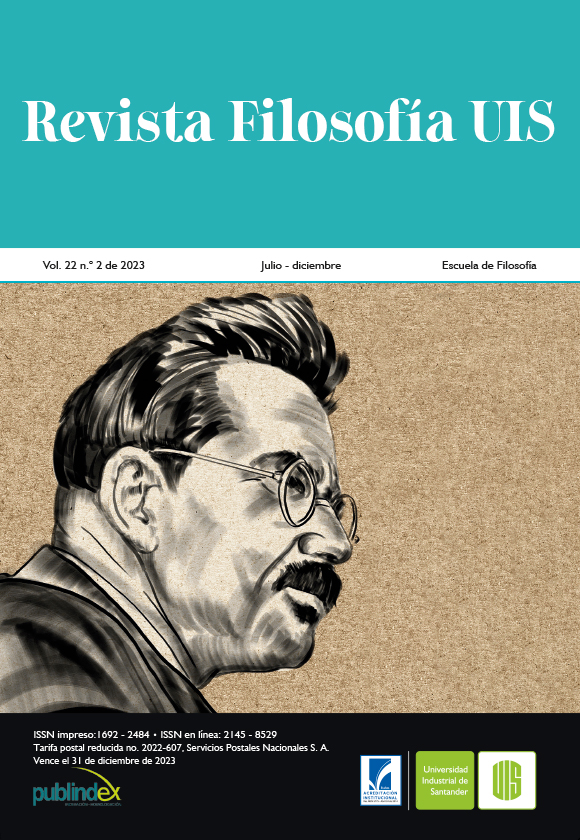On the Heideggerian Concepts of Existence and Being-in-the-world and their Similarities with Some Ortegan and Sartrean Concept
Published 2023-07-31
Keywords
- Dasein,
- Existence,
- Being-in-the-world,
- Human life,
- Consciousness of world
How to Cite
Copyright (c) 2023 Revista Filosofía UIS

This work is licensed under a Creative Commons Attribution 4.0 International License.
Abstract
in this paper, an approach will be made to Heidegger's concepts of existence and being-in-the-world, as they are exposed in Being and time, that is, from the hermeneutics of Dasein, although in some passages other works by the German author will also be used, either to clarify or reinforce certain aspects of the subject. Likewise, it will seek to show how these concepts are related and framed in a broader investigation on the question of the meaning of being. In short, the objective of this paper is to develop an approach to the concepts of existence and being-in-the-world or being-in-the-world and their relationship and place within the Heideggerian inquiry that questions the meaning of being. In addition, some similarities and links between Heidegger's thought and that of Ortega y Gasset and Sartre will be indicated, in broad strokes, always having as points of reference the central concepts addressed in this work. Finally, it will be considered if the philosophical readings of the examined authors are still adequate to describe the phenomenon of life, that is, the human being and its concrete existence.
Downloads
References
- Acevedo, J. (1984). Hombre y mundo. Editorial Universitaria.
- Acevedo, J. (2014). Heidegger: existir en la era técnica. Ediciones Universidad Diego Portales.
- Bakewell, S. (2016). En el café de los existencialistas. Editorial Ariel.
- Cabestan, P. & Tomes, A. (2001). Le vocabulaire de Sartre. Ellipses Édition Marketing.
- Fédier, F. (2013). Después de la técnica. La lámpara de Diógenes. Revista de filosofía, 26(27), 9-27.
- Gusman, S. (2020). Sartre on Subjectivity and Selfhood. Palgrave Macmillan.
- Heidegger, M. (1997). Ser y tiempo. Editorial Universitaria.
- Heidegger, M. (2006). Carta sobre el Humanismo. Alianza Editorial.
- Heidegger, M. (2008). El concepto de tiempo (Tratado de 1924). Herder Editorial.
- Heidegger, M. (2013). Seminarios de Zollikon. Editorial Herder.
- Heldt, C. (2020). Immanence and Illusion in Sartre’s Ontology of Consciousness. Palgrave Macmillan.
- Henry, M. (2010) Fenomenología de la vida. Prometeo Libros.
- Noudelmann, F. & Philippe, G. (2004). Dictionnaire Sartre. Éditions Champion.
- Ortega y Gasset, J. (1964a). El hombre y la gente. En Obras completas, Vol. VII. Revista de Occidente.
- Ortega y Gasset, J. (1964b). En torno a Galileo. En Obras completas, Vol. V. Revista de Occidente.
- Ortega y Gasset, J. (1966). Pidiendo un Goethe desde dentro. En Obras completas, Vol. IV. Revista de Occidente.
- Ortega y Gasset, J. (1981). Historia como sistema. Revista de Occidente/Alianza Editorial.
- Ortega y Gasset, J. (2004). Unas lecciones de metafísica. En ¿Qué es filosofía? & Unas lecciones de metafísica. Editorial Porrúa.
- Regalado, A. (1990). El laberinto de la razón: Ortega y Heidegger. Alianza Editorial.
- Rodríguez, A. (1982). La innovación metafísica de Ortega. Servicio de Publicaciones del Ministerio de Educación y Ciencia.
- Rojas, M. (2021). Existencia y Afectividad: una aproximación al lugar de la dimensión afectiva en los planteamientos de Martin Heidegger y Jean-Paul Sartre. [Tesis de pregrado]. Universidad de Chile. https://repositorio.uchile.cl/handle/2250/186047
- Sartre, J.-P. (1960). “Una idea fundamental de la fenomenología de Husserl: la intencionalidad”. En Situaciones I. El hombre y las cosas. Editorial Losada.
- Sartre, J.-P. (1968). La trascendencia del Ego. Ediciones Calden.
- Sartre, J.-P. (1993). El ser y la nada. Editorial Losada.
- Sartre, J.-P. (2004). El existencialismo es un humanismo. Edhasa.
- Vásquez, D. (2021). Ortega y Gasset: conceptos fundamentales acerca de la vida humana. [Tesis de pregrado]. Universidad de Chile. https://repositorio.uchile.cl/handle/2250/186974
- Vinolo, S. (2022). Temáticas heideggerianas en El ser y la nada de Jean-Paul Sartre. Areté. Revista de filosofía, XXXIV(1), 242-262.

